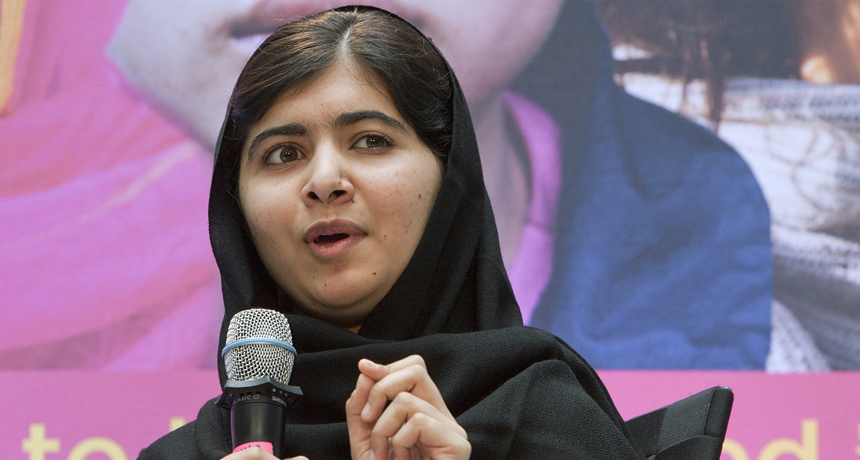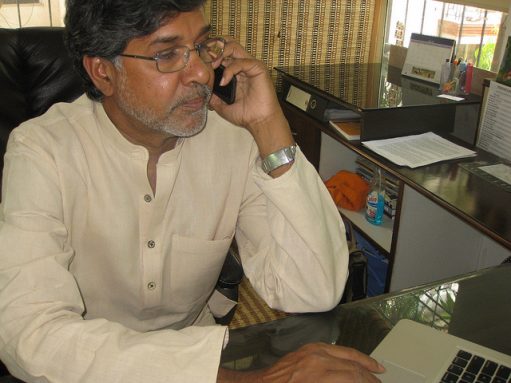Teen wins Nobel for support of educating girls
Two years after a failed assassination attempt, a Pakistani girl becomes the youngest Nobel Prize winner

Malala Yousafzai speaking, last year, at a World Bank meeting celebrating the International Day of the Girl.
World Bank Photo Collection/FLICKR (CC BY-NC-ND 2.0)
By Janet Raloff
Most children live in communities where they are expected to attend school. In the United States, education is deemed so essential that police investigate instances where children stop going to school. But there are parts of the world where a public education is not free — and for whom girls may be discouraged, even at gunpoint, from attending. That happened in the rural area of Pakistan where Malala Yousafzai grew up. Two years and one day after Taliban extremists entered her school bus and shot her in the head, Malala learned she would win a Nobel Peace Prize.
“I was in my chemistry class,” she notes, when the she got the news. Now living in Birmingham, England, she had been learning about electrolysis at the time. Although thrilled to learn of the Nobel, she said she decided to finish out the day in her classes, which included physics and English. She said she wanted to consider it “a normal day.”
It wasn’t. Nothing about her past few years has been totally normal.
At 17, Malala is the youngest person ever selected for the prestigious award. She will share the prize for her category — peace — with Kailash Satyarthi, 60, of India. The two are being honored “for their struggle against the oppression of young people and children’s right to education,” said Thorbjørn Jagland. He chairs the Norwegian Nobel Committee in Oslo. On October 10, he announced his committee’s selection of the two winners.
Until Malala, the youngest person to have claimed a Nobel was physicist Lawrence Bragg. In 1915, at age 25, he won the award for his work on the use of X-rays to probe the structure of crystals.
Unlike its science awards, the Nobel’s prize for peace goes to people whose hard work — and often bravery — has served as an inspiration to others in making the world a safer, healthier place.

This year, there were 278 candidates for this prize. That’s “the highest number we have ever had,” notes Geir Lundestad. He directs the Nobel Institute and is Secretary of the Nobel Committee. The Nobel Peace Prize is “a combination of a human-rights prize and humanitarian prize,” he notes. That means it is meant to honor people who have fought against great odds to bring basic human rights to people lacking these. These rights can include life, liberty, justice, access to food and access to education.
Malala’s contribution
Malala’s father, a poet, ran a public school in their town of Mingora. It was in the Swat District of northwest Pakistan. The mountainous country lies northwest of India in south central Asia. Five years ago, Malala started writing a blog for the BBC (or British Broadcasting Corporation) on what it was like for a girl to get an education in her Muslim country. Because Taliban extremists were taking over in her part of the world, she didn’t sign her name to the blog. But the Taliban found out and sent death threats to her and her father.
Eventually there came a time, she said, when “no one was allowed to go to school.” Terrorists threatened anyone who went to school. “Women,” she said, “were not allowed to go outside of their houses. Education was totally banned. People were killed. At that time, I needed to raise my voice — because I wanted to go back to school. I wanted to become a doctor.”
So she resisted the ban and continued attending school. But only until October 9, 2012. That’s when masked men entered her school bus. They asked the passengers to identify Malala. Then they fired a bullet at the girl. It passed through her head, neck and shoulder. The gunmen also injured two of her friends. The Taliban took credit for the shooting.
Malala’s injuries were so serious that her family thought she would die. But the girl was airlifted to a hospital in England. She was not well enough to be released for nearly three months.
This assassination attempt brought worldwide attention to Malala and the issue of education rights for girls. More than 2 million people across the globe signed a petition arguing for a Right to Education. Pakistan later enacted its first right-to-education law.
The now-recovered teen and her family have remained in England. There they have set up a Malala Fund. Its goal is to fight for the right to a good education for girls everywhere. The group is also fighting against the exploitation of young girls as workers, including domestic laborers (such as cooks, maids and full-time babysitters), who often receive little or no pay.
At a news conference on the day of her Nobel win, Malala said she was “honored that I am sharing this award with [Satyarthi].” She said that his “great work for child’s rights, his great work against child slavery totally inspired me.” She also thanked her father for “not clipping her wings” but instead “letting me to fly and achieve my goal.” That goal, she said, included “showing to the world that a girl is not supposed to be the slave” — and should have rights equal to any boy.
Malala says she no longer plans to attend medical school: “Now, I want to become a politician — a good politician.” And she vows to keep fighting for the education of children the world over.
Fighting child slavery and more
Satyarthi, a former electrical engineer, has been fighting child slavery and child labor in India. A biography on his website claims his efforts have led to the “rescue of over 78,500 child slaves.” In many parts of the world, children are sold to people who make the youngsters work long hours every day for little or no pay. Satyarthi argues that child labor, even when voluntary, is a bad thing. It prevents kids from attending school. And without education, they will never get the jobs to lift themselves and others in their families out of poverty, he says.
Like Malala, Satyarthi too has suffered attacks. They have included repeated beatings and the destruction of his office by people who resented his efforts to rescue children from slavery.
After learning that he had won the 2014 peace prize, Satyarthi said, “This will help in giving bigger visibility to the cause of children who are the most neglected and most deprived.” Child labor and slavery is a “crime against humanity,” he argues. “This is intolerable. This is unacceptable. And this must go.”
Nobel Institute director Geir Lundestad agrees. He said that although the exploitation of children as laborers is falling, “We hope that this prize can speed up this process somewhat.” There still is a long way to go, he added. The Nobel Committee observes that 168 million children across the globe still are forced to work instead of going to school.
Satyarthi and Malala will receive their award at a Dec. 10 ceremony in Oslo, Norway. They also will share more than $1 million in prize money.
Power Words
anode The positively charged electrode in a battery or an electrolytic cell. It attracts negatively charged particles.
cathode The negatively charged electrode in a battery or an electrolytic cell. It attracts positively charged particles.
chemistry The field of science that deals with the composition, structure and properties of substances and how they interact with one another. Chemists use this knowledge to study unfamiliar substances, to reproduce large quantities of useful substances or to design and create new and useful substances. (about compounds) The term is used to refer to the recipe of a compound, the way it’s produced or some of its properties.
crystal A solid consisting of a symmetrical, ordered, three-dimensional arrangement of atoms or molecules. It’s the organized structure taken by most minerals. Apatite, for example, forms six-sided crystals. The mineral crystals that make up rock are usually too small to be seen with the unaided eye.
electrical engineer An engineer who designs, builds or analyzes electrical equipment.
exploitation Taking advantage of one or more people for personal gain. Examples can include making people work for little or no pay, making people do things under threat of harm, or tricking people into giving up something of value.
humanitarian An individual who works to promote safer and better living and working conditions for people and more just treatment of people by companies and governments.
human rights The basic rights that should be available to all people of just treatment; respect and dignity; a nationality; the ability to marry; basic freedoms (of religion, political opinions, speech); protection from slavery, torture and persecution; and the ability to earn a living that will provide basic food and shelter for families. Many details of this are spelled out in the United Nations’ Universal Declaration of Human Rights.
laborer Another name for a worker.
electrolysis The use of an electric current to separate chemicals in a solution. The current forces ions to move towards electrodes — either a cathode or anode — at either end of the system.
oppression Subjecting one or more people to prolonged mental distress, cruelty or enslavement.
physicist A scientist who studies the nature and properties of matter and energy.
Taliban The name means religious students. But the Muslim group has evolved over the decades into self-proclaimed holy warriors or freedom warriors. They first rose up in Afghanistan to free the nation from a government backed by the Soviet military. Later, they have fought local governments and outside military forces. They have also terrorized many communities in Muslim nations, threatening anyone who did not adhere to their extreme religious and cultural views.
terrorism The use of threats or violence to compel people to do things against their will.
X-ray A type of radiation analogous to gamma rays, but of somewhat lower energy.







